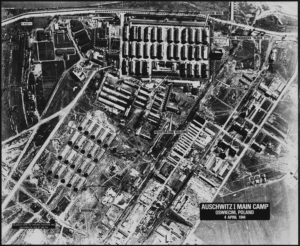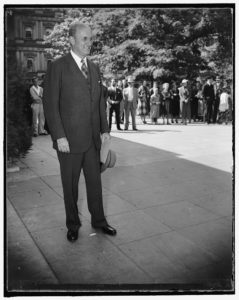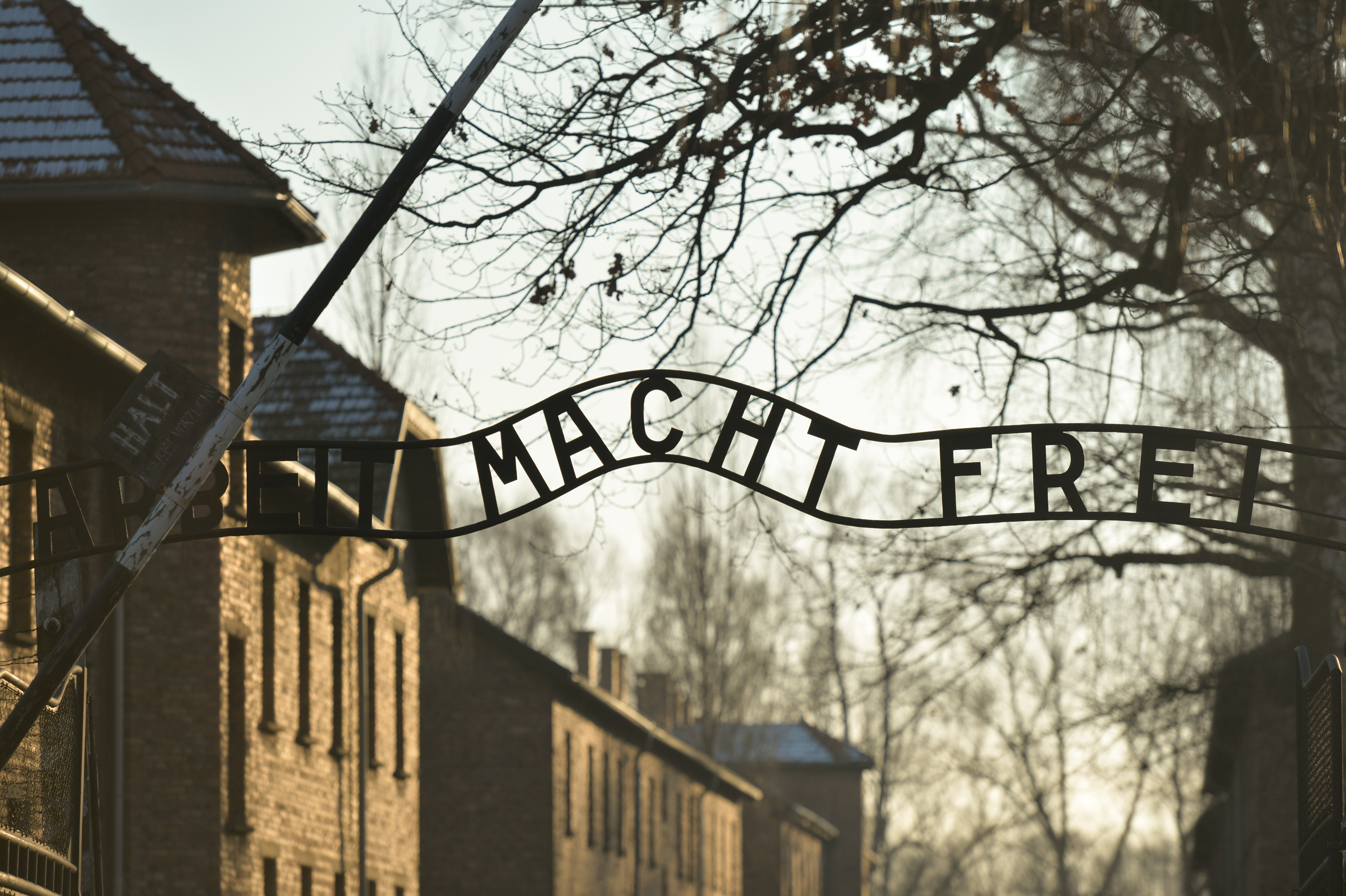Six million Jews died in the Holocaust. Five million others perished under the Nazi regime. When facing such an abhorrent figure historians have long argued– could we have done more? Should we have done more?
A harder look at U.S. policy to save the Jews of Europe has left us with a grim answer to that question. Stringent immigration law coupled with anti-Semitism, is just one part of the complex schema to keep the majority of Europe’s Jews out of America.
It is clear that since the very beginning of the war, those in the upper echelon of the U.S. government were cognizant of the atrocities taking place. In April 1944, Rudolf Vrba and Alfréd Wetzler escaped Auschwitz and their report, known as the Auschwitz Protocols, detailed the camp’s location and it’s geography. The report, describing how prisoners lived and died, gave concrete evidence of the Final Solution. By July of that year, cries from the Jewish Agency to bomb the facilities and halt the killings began in earnest.
HistoryNet spoke with historians Rebecca Erbelding and Michael Berenbaum about the upcoming PBS show, Secrets of the Dead: Bombing Auschwitz to explore the question, “should the Allies have bombed Auschwitz?”
In 1944 alone you have D-Day, Operation Market Garden, the Battle of Hürtgen Forest, and the Allied bombing campaign on German-held oil fields and production plants. Was an attack on Auschwitz possible?

[Erbelding] It was absolutely possible in 1944. The Americans held a base in Foggia, Italy and they were sending bombers over the region that included Auschwitz. We have aerial photos starting in the spring of 1944 – they are attempting to photograph the Buna facility, which is a labor facility near Auschwitz creating synthetic rubber and oil. The Allied planes definitely want to attack that facility. They are flying high range bombers over that area – first surveillance planes and then the Americans do attack Buna at several points. So absolutely, it was possible to fly over that area. I think where scholars disagree is whether targeted bombing was possible.
[Berenbaum] Let’s answer that backwards. The Allies attacked what is called Auschwitz III – Buna-Monowitz – so resources were available. In fact, one of the people who was on that bombing raid was none other than George McGovern, former presidential candidate from South Dakota. That’s a clear argument that the resources were available. Some people argue that the bombing of Auschwitz would have stopped everything, but by the time the United States had the capacity to bomb Auschwitz, Auschwitz had done most of its damage. So the issue of bombing Auschwitz is not incapacitating the gas chambers, it is about making a public statement to the Germans that “we know what the hell you’re doing, and you’re going to face the consequences as well.”
The US Strategic Bombing Survey later estimated that for every 100 bombs dropped, there were 87 misses, eight hits on open ground in target areas, two duds, and three valuable hits. Only one ton of bombs in every 30 struck something worthwhile. With this type of inaccuracy, was it even possible to accurately bomb Auschwitz?
[Erbelding] It was certainly possible to bomb, but was it possible to target hit the crematorium exclusively? I think very few historians would say yes. You could very well take out the crematorium, but with those planes at that time you did not have the technology to pinpoint. That’s one of the misconceptions because we have such a strong memory now of being able to target anyone, any room, any building we want…that technology simply did not exist until after World War II.
[Berenbaum] Precision bombing is not a skill we had during World War II. We would have had to use saturation bombing. There’s a term in military history called “tasking,” that is if you task Auschwitz II-Birkenau for bombing, then everything we know about Birkenau comes to the desk of those who are planning. The problem was knowledge about Auschwitz was segmented. It came in fragments. That information would have been brought together if the bombing had been tasked.
[The Assistant Secretary of War] John J. McCloy’s letter of August 26 was disingenuous. He says, “After a considerable study” – there was no considerable study – “such an action would require the diversion of forces now engaged in decisive operations elsewhere…it would be of such dubious efficacy that it would not warrant the use of such resources.” Then he says there is “considerable opinion to the effect that such an effort might provoke a more vindictive response from the Germans.”
The nature of that letter indicates that the study was from 1942 not 1944. And it indicates that he doesn’t quite understand Auschwitz when he says the effort might provoke a more vindictive response. It baffles the imagination…what is more vindictive than Auschwitz?
Did any Allied commander, such as Ira Eaker of the 15th USAAF, have any knowledge of the Vrba-Wetzler report?
[Erbelding] As far as I know, no. McCloy got a copy of the Vrba-Wetzler report in November 1944 and it doesn’t seem like he read it. Weeks later, when the War Refugees Board releases the report to the public, McCloy complains, “why would they release something without telling me?” even though it was sent to him three weeks earlier. I’ve never seen any sort of transmission into military hands and the full report doesn’t get to Washington until the very end of October or early November, so I don’t think so.
[Berenbaum] The Vrba-Wetzler report did not come to the United States until much later, but had they been interested in the information the report would have come sooner. The question becomes how much of a priority do you make this? And, how essential is it that you get the information?
To my mind, one of the key documents in understanding the situation was the minutes of the Jewish Agency on June 11, 1944. They considered the request from one of their members, a man by the name of [Yitzhak] Gruenbaum, on the issue of whether the Jewish self-government of Palestine should request that Auschwitz be bombed. The conclusion was that they did not know enough about the situation on the ground to request innocent Jews be killed. Now that’s June 11. By July 8 you have the same organization requesting that Auschwitz be bombed.
What happened in the interim? The Vrba-Wetzler Report.
Roosevelt creates the War Refugees Board in 1944 with John Pehle at the helm. However, an internal memorandum within the War Department maintains that the most effective relief is to defeat Nazi Germany and that the U.S. Army would not engage in humanitarian missions. Was this Roosevelt’s way of getting around that memorandum to save European Jews?
[Erbelding] One of the challenges with Roosevelt, in particular, is that he does not give us his motivation for very many things. He doesn’t let people take notes in meetings, and he has a tendency to tell whoever was in the room with him whatever they want to hear, then tell the next person the exact opposite. He’ll then just do what he had planned to do all along. But in January 1944 – six months before the first request to bomb Auschwitz – Roosevelt creates the War Refugee Board.
He says that it is U.S. policy to try to rescue Jews and other persecuted minorities – as long as it does not interfere with the war effort. So I think this is what John Pehle is reacting to when McCloy says the War Department is not going to pursue bombing Auschwitz. Pehle knows that he cannot divert resources so he lets the matter drop until November 1944.
[Berenbaum] That was certainly the policy. The question becomes, when responding to genocide and mass murder, how do you deal with a regime that is thoroughly, totally, and completely committed to genocide? There was an earlier meeting where Franklin D. Roosevelt told Jan Karski, “you tell your people we shall win the war and then save the refugees.” Karski, who was at that time a 25-year-old nobody, said, “by then it will be too late.”
That’s the issue. That’s why the symbolic moral significance of bombing Auschwitz might outweigh the military question.
The U.S. has come under the microscope for its stringent immigration policies during that time period. How instrumental was Pehle in saving the Jews of Europe?
[Erbelding] The U.S. could and should have done more to save European Jews. We do not change our immigration laws even when it becomes clear that life in Germany and life in Nazi-occupied Europe is getting incredibly difficult for Jews. We don’t have a refugee policy to speak of – you cannot come as a refugee fleeing persecution. You cannot seek asylum here. You have to go through a slow and deliberate immigration process. It gets even more difficult when war begins and there is this idea that Jewish refugees are secret Nazi spies.
It’s also more physically difficult with Europe at war. By the summer of 1940 you basically have to get to Lisbon if you want to find a boat to take you to the U.S., and then you have to traverse a continent at war.
When we talk about 1944 and the first announcement of a policy of rescue, it is very late in the war. It is 11 years into Hitler’s rule in Germany and by that point about five million Jews have been killed. One of the reasons I think the War Refugee Board is as successful as it is – they estimate that at the end of the war they had saved tens of thousands of lives, and I think that is probably about right – is that the Allies are winning the war. This gives the Allies the leverage to push neutral states to do more. It gets Nazis who are nervous about their postwar fate to start ransom negotiations with Americans. The same goes for the neutrals: Switzerland, Spain, Sweden, Portugal, and Turkey, who have been playing both sides the whole time. Now it’s clear that the Allies are going to win so if the Americans say, “we care about the fate of the Jews,” maybe those countries are willing to allow more leniency themselves. Allow people to escape into their borders and pass on intelligence in Nazi-held territory.
[Berenbaum] The first thing is to go back to an incredible memo that was written and submitted to Henry

Morgenthau Jr. on January 13, 1944. The memo was called “Report to the Secretary on the Acquiescence of This Government in the Murder of the Jews.” It was written by one of Pehle’s close associates, Josiah DuBois. It was co-submitted to Morgenthau by Pehle and Randolph Paul. Three gentiles, three non-Jews, submitted a memo that accused the U.S. government of not only not taking action to help rescue, but also actually hindering rescue – covering up, lying, fabricating, and all sorts of other things.
When Morgenthau read it he became visibly shaken. He then condensed the report and gave it a much more neutral title called “Report to the President.” Roosevelt asked him what he wanted and Morgenthau said, “I want a war refugee board.” Roosevelt named him chairman and John Pehle, was executive director.
Pehle then became the chief advocate for rescue. His judgment on it, said very simply was, we did too little and we did it too late. By 1944, 90 percent of the Jews who were to be killed in the Holocaust were dead.
This is all counterfactual history, but let’s say the U.S. did target the gas chambers. What do you think the repercussions inside the camp would have been, and secondly, could this have played into Nazi propaganda?
[Erbelding] It’s hard with counterfactuals like this because there are so many factors involved. It really is hard to know for sure and this is something that historians obviously still discuss and debate all the time. We’re close to universal understanding now that bombing was possible, but then we all disagree on what would have happened had the Allies attempted it. Would it have been successful? Would the Nazis have used it as propaganda – we didn’t kill the Jews, the Allies did. I don’t know and I think that’s the problem with counterfactuals, history only happened one way. These are the fights that we have now. We speculate on what might have happened and argue the likelihood of that speculation.
[Berenbaum] In Elie Wiesel’s Night he says, “But we were no longer afraid of death; at any rate, not of that death. Every bomb that exploded filled us with joy and gave us new confidence in life.” And the reason that it filled them with hope is because it meant that somebody knew what the hell was happening. And consequently they were no longer suffering a death unknown. Many in the camp were afraid that not only they wouldn’t survive, but the memory of their destruction wouldn’t survive.
Part of the reluctance of people to advocate bombing was because they understood it would have entailed the death of innocent civilians. But the question is, were these innocent civilians doomed to die anyhow? And consequently the question then becomes, do you destroy the infrastructure of the camp to make killing more difficult?
What effect, if any, did Assistant Secretary of State Breckinridge Long’s false claims about Jewish immigration have in contributing to more loss of life? Is it too simplistic to say anti-Semitism played a role?
[Erbelding] American immigration law from the 1920s is based on eugenic science – the idea that logically some people are better than others. That law was created by Congress. That law was then interpreted by the State Department, and after 1939 by Long’s division. It is clear that he himself was anti-Semitic and nativist. It is hard to differentiate. Does he not like immigrants? Does he not like them because they are Jews? Both can be true.
His, and his department’s, interpretation of immigration law does not make it easier, but it is also the responsibility of Congress to create that law. It is the responsibility of the American people to push their Congress to create a more generous law. And what we know from public opinion polls from that time is that Americans sided with keeping immigrants out. Even when it was clear that these immigrants, these refugees, were experiencing violence in Europe. The American people by and large want to keep them out. I think it is a little too simplistic to blame it all on Breckinridge Long, when he is a very clear symptom of a much larger problem.
[Berenbaum] We can understand a little bit of the anti-immigrant sentiment because today, under different circumstances, we also have anti-immigrant sentiment.
Breckinridge Long was an anti-Semite. He did everything imaginable to hamper immigration. He created what historian David Wyman called “paper walls.” You’d have to fill out document after document. He thought he was doing the bidding of the American people. He didn’t understand that the Jews coming in would have an anti-Nazi sentiment. He was concerned that the Nazis would sneak in a fifth column in these requests for immigration.
He used the notion that Jews would take American jobs. This was right after the Depression, with an excess of 25 percent unemployment. This was like adding fuel to the fire. If you’re looking for a boogeyman on immigration, on a scale from one to 10, Breckenridge Long was a 15. That’s the nicest thing I can say about him.

Do you think the documentary is a subset of a much larger issue, the American refugee policy?
[Erbelding] It’s such an important point. The debate over bombing Auschwitz is a metonym for the American response during this whole period. It is a very tangible thing, which is one of the reasons we point to it. Immigration policy and immigration law can be intangible. This was a direct thing that could have happened that may have done some good, but for various reasons the War Department decides that it is not their priority. It is perfectly valid for us to say, “well, what is not a bigger priority than trying to disrupt mass murder?” But I think we do use it as a stand in to some extent, as a metaphor for the entirety of the American response during the war; our immigration laws, American anti-Semitism and racism – against Jews and others. It becomes a stand in.
[Berenbaum] I wrote a review of a book on FDR and the Jews. The title of the review was, “FDR was the Best.” He was the best of his predecessors in responding to genocide, but that’s not a compliment. How do the United States and the Western governments, which seemingly are governments based on values, respond to genocide? What do we do in regards to refugees? What do we do in regards to rescue? What do we do in regards of hampering the process?
Secrets of the Dead: Bombing Auschwitz premiers on PBS January 21, 2020 at 9 p.m. EST.





